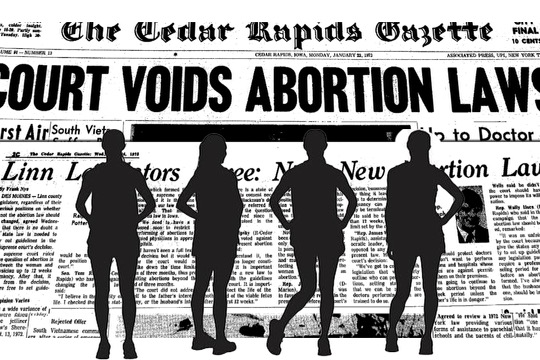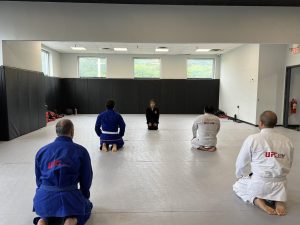Post-Roe, America Unravels for Female Athletes
Testimonies and Supreme Court documents reveal that female athletes feel nervous about the future
September 28, 2022
America is never stagnant. Landmark achievements can shape an entire generation. Some can be touchstones for American freedom, while others may tip the scales completely.
On June 23, 1972, Congress passed Title IX, which prevents sex discrimination in educational settings that receive federal funding. The act was one of many education reforms that were passed that year. It was a progressive milestone on the tail end of a tumultuous period of social upheaval characterized by the sexual revolution, the Vietnam War and the civil rights movement.
Title IX reinforced constitutional freedom. It was — and still is — a fundamental pillar of women’s rights in America. Today, Title IX is often referenced for giving women the same opportunities and funding for athletics that are given to men.
Roe v. Wade was another constitutional precedent that was settled during this period of time. The Supreme Court of the United States ruled in favor of reproductive choice on Jan. 22, 1973, roughly seven months after Title IX passed in Congress.
Title IX celebrated its 50th anniversary on June 23, 2022. The anniversary was grimly followed by the Supreme Court’s decision to overturn Roe v. Wade just one day later on June 24.
Advocacy groups such as Planned Parenthood and the American Civil Liberties Union have cited the 1973 decision as a crowning achievement for equal rights, arguing that the constitutional right to freedom includes the right to reproductive choice.
However, the Supreme Court has recently swung to the political right. In the case of Dobbs v. Jackson Women’s Health Organization, a case which involved a Mississippi law that would ban abortions after 15 weeks, the majority opinion held that “the constitution does not confer a right to abortion.”
“Without Roe’s constitutional protection of women’s bodily integrity women would not have been able to take advantage of Title IX and achieve the tremendous level of athletic participation and success that they enjoy today.” Dobbs v. Jackson, amicus curiae brief
This effectively overruled Roe as well as Planned Parenthood v. Casey, a similar case decided in 1992 that furthered the precedent set by Roe v. Wade. The decision caused an upset throughout the nation.
Before the ruling, a draft opinion was leaked to Politico. An analysis by the Graduate School of Global Affairs at Tufts University found that following the leak, social media (specifically Twitter) erupted in negativity, reaching a peak on June 24.
A particular subset of these reactions belonged to female athletes. Many of these athletes have since made statements regarding their fears that go beyond what other activists are saying about a “Post-Roe America.”
A general sentiment among female athletes is best articulated by an amicus curiae brief in support of abortion access. The brief was submitted during the Dobbs case and consists of testimonies from over 500 current and former women in sports.
“Knowing I had the option to control my body and my life … is what gave me the freedom to pursue my dreams.” Anonymous professional soccer player
“Without Roe’s constitutional protection of women’s bodily integrity,” the authors said in the brief, “women would not have been able to take advantage of Title IX and achieve the tremendous level of athletic participation and success that they enjoy today.”
Many of these arguments cite deliberations from Roe and Casey. Primarily, the brief stated that women athletes would not be able to fully participate in sports without the protections afforded by Roe.
Quoting Casey, the brief argued, “For a female athlete facing the physical and emotional realities of pregnancy, the right to decide whether to carry a pregnancy to term is critical for her ability to ‘participate equally in the economic and social life of the Nation,’ including sports.”
The brief also included personal stories. An anonymous professional soccer player recounted her experience and, crucially, her freedom of choice under the Roe precedent.
“I accidentally became pregnant in college due to a failure in my birth control,” the player explained. “I went to Planned Parenthood to discuss my options, and I decided to have an abortion to ensure I could continue to pursue my collegiate and professional soccer career … knowing I had the option to control my body and my life … is what gave me the freedom to pursue my dreams.”
The brief’s argumentative power lies in the balance between a woman’s dreams and her personal life. Once again quoting Casey, the brief explained, “The decision to become pregnant, thereby risking long-term health and career consequences, involves ‘the most intimate and personal choices a person may make in a lifetime, choices central to personal dignity and autonomy.’”
The brief features many prominent female athletes such as soccer star Megan Rapinoe and water poloist Ashleigh Johnson. It is a culmination of years of activism by athletes across the nation.
Some, such as Billie Jean King, a legendary tennis player and icon of the women’s rights movement, have spoken out even before the decision was released.
“I wasn’t ready to be a mom, and having an abortion felt like I was given a second chance at life.” Crissy Perham, an Olympic swimmer
In May of 2022, King tweeted, “A woman has had the right to make decisions for her body since #RoeVWade in 1973. If Roe falls, millions of Americans would lose access to critical reproductive care.”
On the day of the decision, these athletes solemnly reflected on the consequences. During a pre-match press conference, Rapinoe condemned the majority opinion.
“I wish we could talk about soccer today,” Rapinoe said. “But obviously, with the ruling on Roe v. Wade, obviously that takes precedence over everything.”
In a tweet, tennis player Coco Gauff shed light on a major risk of banning abortions, saying that “The sad part is this (the Supreme Court ruling) will not stop abortions from happening … this will only increase illegal and unsafe abortions. Today is a very sad day for our country and I cannot believe once again history is repeating itself.”
If America stands for denying reproductive rights in favor of a strict interpretation of the Constitution, then these women want nothing to do with it.
Johnson — who featured in a Time magazine article — spoke about the lasting repercussions women may face. “It’s just one more barrier. It’s really hard to consider sports this clear pathway for girls to find empowerment and for women to really pursue their dreams if they don’t have these protections.”
Time also featured Crissy Perham, an Olympic swimmer and gold medalist who is personally invested in abortion rights activism. Perham publicly shared her story in the brief. When she was in the midst of her collegiate career, on scholarship at the University of Arizona, her birth control failed. She was faced with a daunting decision.
“I wasn’t ready to be a mom, and having an abortion felt like I was given a second chance at life,” Perham wrote in the brief. “I was able to take control of my future and refocus my priorities. I got better in school, I started training really hard, and that summer, I won my first national championship. My life would be drastically different if I had been pregnant and forced to sit that race out, because that race changed the course of my life.”
Following the abortion, Perham made the national team. Perham called out what she views as hypocrisy: praising Title IX as a major step forward just a day before the Supreme Court ruling. For her, and many athletes across the nation, it is hard to hear that women’s opportunities have been expanded and that Title IX offers equality and freedom, all while those very freedoms are seemingly undermined.
There have been undeniably negative reactions to the reversal of Roe v. Wade, and female athletes make up a considerable share of these outcries. For these women, Title IX and Roe v. Wade were two sides of the same coin. Removing one undermines the other and puts female athletes in danger.
If America stands for denying reproductive rights in favor of a strict interpretation of the Constitution, then these women want nothing to do with it. They have demonstrated a will to redirect the narrative of this nation, leveraging their platforms to highlight what they believe should be lasting reform.













